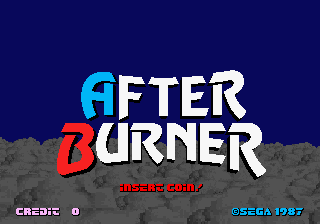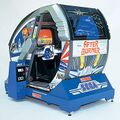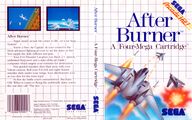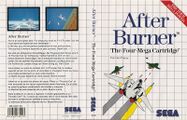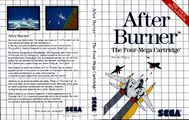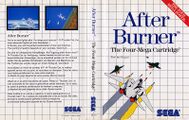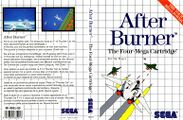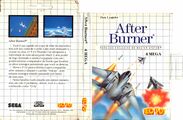After Burner
From Sega Retro
| After Burner | |||||
|---|---|---|---|---|---|
| System(s): Sega X Board, Sega Master System | |||||
| Publisher: Sega | |||||
| Developer: Sega AM2 | |||||
| Genre: Shoot-'em-Up | |||||
|
After Burner (アフターバーナー) is an arcade game designed by Yu Suzuki and developed by Sega AM2 in 1987.
After Burner stands as one of Sega's most successful arcade games, building on the momentum started earlier in the decade with Hang-On, Space Harrier and OutRun. It was one of the earliest games (if not the earliest game) to utilise Sega X Board technology allowing for the easy scaling and rotation of in-game sprites. It is also remembered for its then-revolutionary sit-down cabinet design, complete with a horizontally rotating seat and a vertically rotating cockpit, controlled (like the game) by the integrated flight stick. Upright cabinets were also available.
Contents
Gameplay
In After Burner, the player pilots an F-14 Tomcat-inspired jet through 18 levels, destroying enemies with machine gun fire and a limited supply of missiles. Similar to Space Harrier, it is an "on-the-rails" shooter - the plane will travel continuously into the screen, with players only able to adjust its X and Y coordinates.
The objective in After Burner is to survive through each of the 18 stages, usually by avoiding enemy missile fire, however "bonus" stages, which occur every six levels, require the player to dodge scenery and not crash. Shooting down enemies is technically optional, although alleviates the risk of being destroyed. The player has a limited supply of missiles which are refueled at various intervals throughout the game.
History
Legacy
The original After Burner was released exclusively in Japan, however the western world would receive an updated version of the game, After Burner II in the months which followed. After Burner II is extremely similar in design, bar a few minor tweaks (such as a throttle control, extra levels and slight changes to the missile system), so much so that people often consider it to be a more "complete" version of After Burner than a direct sequel. Due to the similarities and shared cabinet designs and artwork, After Burner II is frequently confused for the original After Burner. A similar relationship would develop with Galaxy Force and Galaxy Force II, also produced by Sega AM2.
In its original form, After Burner was only ported to the Sega Master System, however many ports of After Burner II were released under the name of After Burner for home consoles and computers, including the Amiga (twice), Amstrad CPC, Atari ST, Commodore 64, DOS, FM Towns, MSX, PC Engine, Sharp X68000 and ZX Spectrum.
It was also ported to the Sega 32X by Rutubo Games and went under the name of After Burner Complete.
After Burner in its original form was also released as part of Sega Arcade Gallery for the Game Boy Advance.
Gallery
Physical Scans
X Board Version
Template:ScanflyerTemplate:ScanflyerTemplate:Scanflyer
Master System Version
| Sega Retro Average | |||||||||||||||||||||||||||||||||||||||||||||||||||||||||||||||||||||||||||||||||||||||||||||||||||||||||||||
|---|---|---|---|---|---|---|---|---|---|---|---|---|---|---|---|---|---|---|---|---|---|---|---|---|---|---|---|---|---|---|---|---|---|---|---|---|---|---|---|---|---|---|---|---|---|---|---|---|---|---|---|---|---|---|---|---|---|---|---|---|---|---|---|---|---|---|---|---|---|---|---|---|---|---|---|---|---|---|---|---|---|---|---|---|---|---|---|---|---|---|---|---|---|---|---|---|---|---|---|---|---|---|---|---|---|---|---|---|---|
|
| 64 | |
|---|---|
| Based on 21 reviews | |
| Master System, KR |
|---|
|
- ↑ ACE, "April 1988" (UK; 1988-xx-xx), page 51
- ↑ Aktueller Software Markt, "März 1988" (DE; 1988-02-19), page 41
- ↑ Complete Guide to Consoles, "" (UK; 1989-10-16), page 47
- ↑ Complete Guide to Consoles, "Volume IV" (UK; 1990-11-xx), page 89
- ↑ The Complete Guide to Sega, "" (UK; 1991-05-xx), page 52
- ↑ Computer Action, "Juli/August 89" (DK; 1989-0x-xx), page 34
- ↑ Console XS, "June/July 1992" (UK; 1992-04-23), page 137
- ↑ Computer & Video Games, "March 1988" (UK; 1988-02-15), page 122
- ↑ The Games Machine, "March 1988" (UK; 1988-02-18), page 54
- ↑ Games Preview, "8/9 1989" (DK; 1989-xx-xx), page 67
- ↑ Génération 4, "Eté 1988" (FR; 1988-0x-xx), page 20
- ↑ Micromanía (segunda época), "Enero 1990" (ES; 19xx-xx-xx), page 27
- ↑ Mean Machines Sega, "October 1992" (UK; 1992-09-xx), page 132
- ↑ Power Play, "Ausgabe 3" (DE; 1988-02-22), page 91
- ↑ Sega News, "Říjen 1996" (CZ; 1996-xx-xx), page 27
- ↑ Sega Power, "October 1991" (UK; 1991-09-05), page 40
- ↑ Sega Power, "October 1991" (UK; 1991-09-05), page 55
- ↑ Sega Pro, "November 1991" (UK; 1991-xx-xx), page 18
- ↑ Sega Pro, "April 1993" (UK; 1993-03-11), page 70
- ↑ Software Gids, "Mei/Juni 1990" (NL; 1990-05-xx), page 31
- ↑ Tilt, "Mai 1988" (FR; 1988-0x-xx), page 100
- No players field
- Use romtable template
- All games
- Old-style rating (ace)
- Old-style rating (asm)
- Rating without source
- Old-style rating (cgtc)
- Rating without PDF source
- Old-style rating (cvg)
- Old-style rating (gamesmachine)
- Old-style rating (gamesmachineuk)
- Old-style rating (generation)
- Old-style rating (micromania)
- Old-style rating (segapower)
- Old-style rating (segapro)
- Old-style rating (tilt)
- Update ratings template
- 12 old ratings
- After Burner (franchise)
- X Board games
- Mega-Tech games
